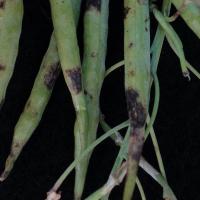Diagnosing alternaria black spot in canola
A dark-spot forming fungal disease that is mainly a problem in wet warm spring weather.
What to look for
- Plants with target-like or black spot lesions on leaves that may be more common in moister areas.
Paddock
- Alternaria infects all growth stages of canola plants.
- Spots on leaves have a concentric or target-like appearance and are brown, black or greyish white with a dark border. Leaf spots may join causing leaf death.
- Lesions on green leaves are often surrounded by a yellow halo. Leaf lesions can join and cause leaf death and premature defoliation.
- Stem lesions start as small brown or black dots that elongate and expand. Seeds under pod lesions may die, and pods often prematurely ripen and shatter.
Plant
What else could it be
| Condition | Similarities | Differences |
|---|---|---|
| Diagnosing blackleg in canola | Greyish leaf lesions. Elongated stem lesions. Dark pod lesions | Blackleg lesions contain dark fruiting bodies. blackleg stem lesions are hard and ivory coloured with dark fruiting bodies. |
Where did it come from?

Wet or humid conditions
- Alternaria survives the inter-cropping period on infected canola stubble, on cruciferous weeds and on seed.
- Seed infections can cause seedling damping off.
- Initial crop infections are caused by wind blown spores. These lesions produce further spores and infections can then be spread throughout the crop by either the wind or rain.
- Mild, humid conditions favour disease development and the disease cycle will continue throughout the season under favourable conditions.
- Hot and dry conditions interrupt epidemics as the absence of moisture greatly reduces spore production. Major outbreaks are not common in Australia as weather conditions are normally less favourable throughout podding.
Management strategies

Rotation
- Alternaria is very common in canola crops but is not usually severe enough to warrant control.
- There are no registered fungicide seed treatments for Alternaria in Australia. If pods were infected in the previous season, obtain fresh disease free seed.
- In areas where Alternaria is a problem select paddocks isolated from previous years canola stubble as Alternaria spores are easily transported in wind and can spread into areas that have not had canola for several years.
See also
Where to go for expert help
Page last updated: Friday, 17 April 2015 - 2:27pm




